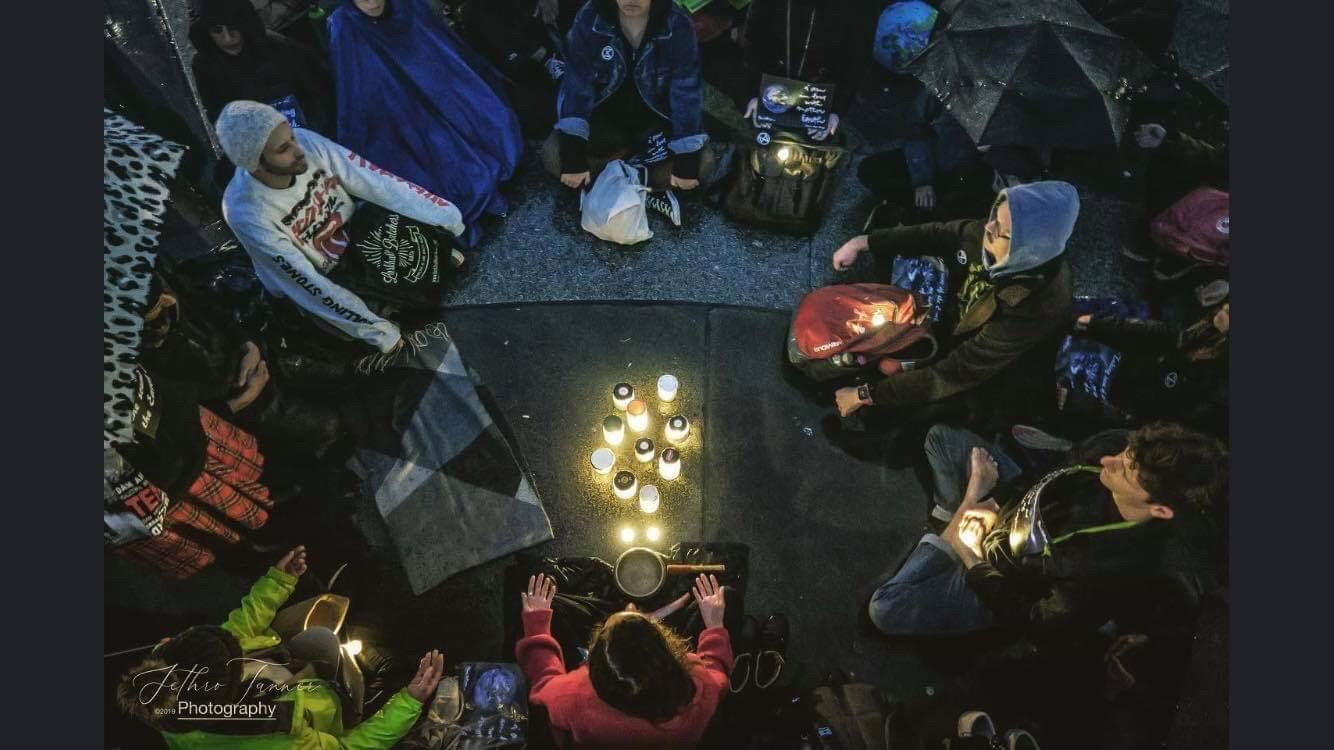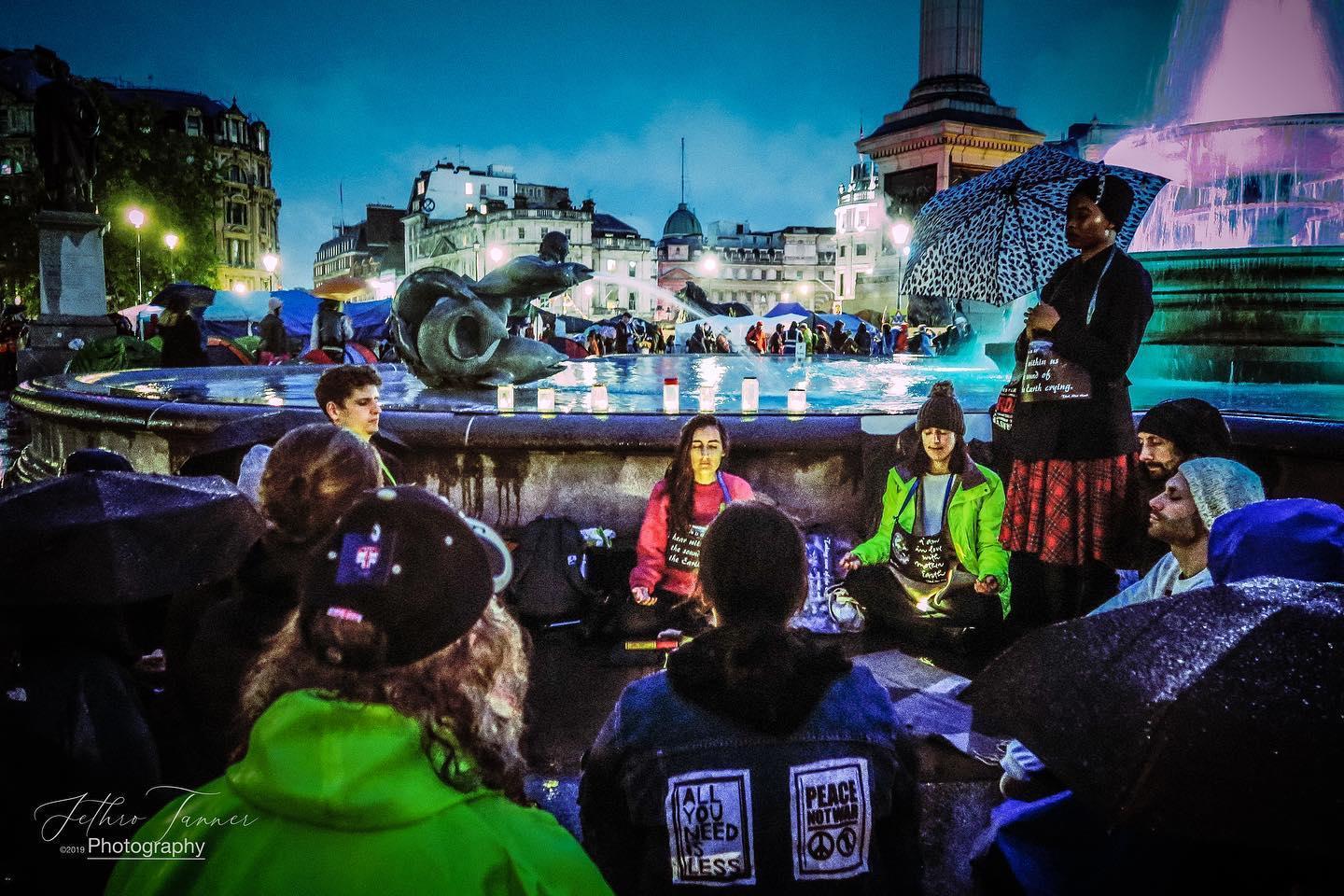Climate Emergency Public Services Work
Charlie Stott
Our newest addition to the IGP team shares his experiences with Extinction Rebellion and how he feels that society could shift in a prosocial and ecological direction through innovative proposals like Universal Basic Services.
In April this year I first went to the protests organised across central London by Extinction Rebellion. I had never attended a demonstration before. To my surprise I found myself in a movement that embodied and tied together many of the views, directions and values that had previously made me feel quite isolated but to me were obvious, urgent and inevitable given the current state of affairs in the world.
I had graduated from university a few months prior and had felt disenchanted by the options that lay ahead of me. It struck me that the typical jobs my fellow graduates were taking were only contributing to an already overgrown economy that was promoting inequality and consumerism while pushing the climate into crisis. I wanted to do something that made me joyful. It appeared that the signs were everywhere – air pollution, the unrelenting noise and busyness of the city, the all too large presence of social media, the separation of my life from nature, and the constant bombardment of advertising. It seemed that little of life had not been infiltrated and subsumed by a logic that reduced the breadth of life down to economics and growth. Economic rationality was subsuming everything else. A rationality of meaning was what I was looking for.

XR protest meditation in Trafalgar square with members of the Plum Village community at the October Rebellion (image credit: Jethro Tanner Photography)
I had begun to explore alternate worldviews and for many years I had been reading, studying and practicing Buddhism and meditation. This gave me a perspective on many of the views and assumptions that were de facto in my culture and spoke to me of the value of self-exploration, calmness, community, compassion and enjoying and accepting life as it is in the moment instead of jumping into craving and overactivity to chase something attractive in the future. It seemed to me that many elements of my culture like overconsumption, chasing status, wealth, fame or appearance, and working unmeaningful jobs that contribute to climate change was based in the latter way of being.
'Economic rationality was subsuming everything else. A rationality of meaning was what I was looking for.'
In Extinction Rebellion I found a synthesis of these two sides to my life. I was surrounded by many people who felt the same way as me about how we live in society, and at the core of the movement were a set of principles like non-violence and regenerative culture that were a fit with spiritual values. Despite the important messages pointing to the depth of the climate emergency we find ourselves in, there was also a palpable sense of hope at the protest sites and the feeling that we were embodying the new kind of community we wanted to see in the world – one that would have a much smaller impact on the environment while also giving people fairer, happier and more meaningful lives.
'We were embodying the new kind of community we wanted to see in the world'
I had another taste of living in this kind of community when I was lucky enough to represent Extinction Rebellion during a retreat at a famous eco-meditation centre called Plum Village in the south west of France. The Plum Village tradition grew out of a commitment to “Engaged Buddhism” – a form of spiritual practice, social work and activism based on Buddhist principles. Central to the tradition is the recognition that humanity is not separate from nature, and that people are interdependent with each other. The atmosphere at the retreat was joyful because of the regenerative community lifestyle and the wonderful meeting of minds that shared the same intention to bring about a prosocial and ecological change in the world. Smaller communities like these, which do not play by the same rules, can give us clues about what to change and how to organise wider society.

XR protest meditation in Trafalgar square with members of the Plum Village community at the October Rebellion (image credit: Jethro Tanner Photography)
The dual crises of the climate and inequality are showing that organising society with economic growth as your only imperative is not working. There is also a related crisis of individual autonomy. Many people feel that they have to live in such a way that fits an economic imperative but does not align with their other values. Aside from the climate crisis, movements like Extinction Rebellion are also a reaction to this felt sense of a lack of autonomy. That is why their actions always include art, music, dance, meditation, food sharing, and other activities that do not conform to economic imperatives. As André Gorz said “the basic problem which confronts us is getting beyond the economy” (Capitalism Socialism Ecology, André Gorz). The IGP have been leading the way on one policy that may enable us to do that – Universal Basic Services.
“The basic problem which confronts us is getting beyond the economy”
André Gorz
Universal Basic Services (UBS) is a radical policy proposal developed by the IGP that aims to meet the basic needs of every member of society regardless of income. UBS is founded on the belief that everyone has the right to a good and meaningful life and that the conditions for such a life should not be left to market forces. The IGP model of UBS provides access to food, shelter, transport, education, healthcare, information legal and democratic services.
UBS has the potential to achieve long-term environmental sustainability by providing better access to greener energy, housing and transport services for larger portions of society than previously possible, while empowering individuals through greater economic stability to make more autonomous sustainable lifestyle choices that express their prosocial and ecological values that lie beyond the economy. UBS is one policy that could help to bring into existence the kind of community that movements like XR and Plum Village are trying to imagine and embody. Below is a brief overview of the IGP’s model of UBS and its effects.
'UBS is founded on the belief that everyone has the right to a good and meaningful life and that the conditions for such a life should not be left to market forces.'
Transport
With a free and improved public transport system, fewer people will need to drive, meaning lower emissions; cars and taxis release around seven times more greenhouse gas emissions than buses. With more people opting to take buses, there will be fewer cars on the road driving down emissions, improving air quality and decreasing the associated effects of air pollution on health and wellbeing. A global review this year found that air pollution may be harming every organ in the body, with consequences for fertility. Alongside the social cohesion and community that UBS is likely to create, people will be healthier and happier, reducing the need for energy-intensive interventions.
Work-life balance and Consumer choice
Improved public transport will also help people to take on jobs that they previously could not access due to travel considerations, giving greater flexibility in the job market. With the economic stability afforded by UBS, people will be empowered to make bold choices about the type and quantity of work they do and the types of products they buy. The public are more conscious of the effect of their lifestyles on society and the environment, and many people are seeking to live and work in a way that creates a positive social and ecological impact. With UBS, individuals will know that their basic needs for food and shelter will be met which gives them greater power to choose not to buy products or to work for corporations that damage the planet and ignore social or environmental issues.
Housing
The housing stock in the UK is made up of homes of a wide range of ages and is one of the least energy efficient in Europe. A recent report by the NHF found that more than 8 million people were living in unsuitable housing. The Select Committee on Environmental Audit suggest that in 2050 housing could account for 55% of UK carbon emissions. Housing in the UK is in crisis both from a social and ecological standpoint. The IGP model of UBS doubles the existing social housing stock (as of 2017). The building of large numbers of modern energy efficient well insulated homes represents a great opportunity to drastically reduce the carbon footprint of the nation.
Societal change
Related ideas, including reducing working hours and changing models of ownership, that will help to implement UBS may also have significant positive impacts on the climate crisis. Research suggests that there may be a strong link between number of working hours and greenhouse gas emissions. Models of shared ownership such as libraries and food coops can also be more sustainable as they allow communities to support themselves in self-determined ways that are both good for them and fit with their values. Food coops often sell sustainably grown produce with less packaging and libraries require much fewer books to be printed than in private ownership.
Though my journey with Extinction Rebellion continues, the road has naturally taken me to the IGP where I have recently started working. It’s a natural fit because its mission to rethink prosperity in non-economic terms resonates deeply with my own aspiration towards a world where the economy is subordinate to deeper values that we can’t attach a number to. UBS is one way that if enacted may help us to shift society towards those deeper social and ecological values, which will help us to navigate our way out of the climate crisis into a better future. We are exploring this pathway and others at the IGP.
Fatemeh Sadeghi
30 May 2024 Feminists in the Global South have stepped out of the conventional territories of ‘women’s matters’ into more fund...